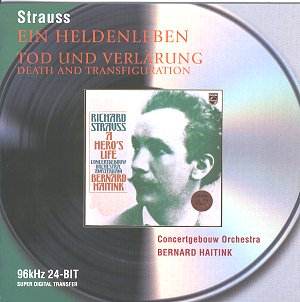 |
Richard STRAUSS Crotchet
AmazonUK
AmazonUS |
Here is yet another in Philips' superb series of reissues from the cream of its back catalogue. It is becoming ever more apparent, as releases appear on this and similar series from EMI, DG and Decca, that the 60s, 70s and 80s represent a golden age of classical recording, when confidence amongst artistic institutions and in the music industry was riding high as never before.
Bernard Haitink's fine recordings in Amsterdam, London and Berlin marked something of a high point even within this period of excellence, and the later slow then rapidly increasing decline in the confidence of the major companies in classical recording after the recession of the late 1980s was tragically typified by the cancellation in the late 1990s of Haitink's second Mahler cycle (with the Berlin Philharmonic) after seven of the symphonies had been recorded.
But here we are in happier times. Ein Heldenleben from 1970 sees Haitink at the height of his powers in British and Dutch music making, holding the chief conductorships of the both the Concertgebouw and London Philharmonic orchestras. Death and Transfiguration is from 1981 by which time Haitink had relinquished his role at the LPO and had moved into opera as Music Director at Glyndebourne (still of course with the LPO) which led, ultimately, to his post as Music Director at London's Royal Opera.
New Haitink recordings were eagerly anticipated by collectors, particularly in the UK and Europe. The LP cover of Ein Heldenleben, a photograph of the younger Richard Strauss transferred from black and white into green (nowhere near as tacky as it sounds!) was to be seen in racks in record shops throughout the continent and, by all accounts, it enjoyed brisk sales. On the evidence of this superb 96kHz 24-bit transfer this is hardly surprising.
The analogue recording manages to achieve the tricky balancing act of providing open and transparent sound without loss of warmth and impact. The Philips engineers were going through a purple patch at this time and it is interesting to note that the 1981 digital recording of Death and Transfiguration (first released in 1983) shows that they were still on a learning curve with the new technology - the sound is more distant and slightly less integrated. But this is splitting hairs somewhat.
The vital and dramatic opening of Ein Heldenleben is totally arresting and provides a marker for what is to come. The excellent balances allow a considerable amount of often unheard detail to come through clearly and naturally - Richard Strauss who loved to incorporate different melodic strands and themes to take place almost simultaneously would surely have loved the sounds as captured on this disc. Haitink carefully avoids any meandering or unforced tempo changes throughout the work which is greatly to its advantage. He carefully unfolds the climaxes, piled one on top of the other, in a most natural manner which builds the tension to far greater effect than the 'pulling-about' we hear from so many other conductors. The famous pauses (here at 3.43 on track 1 'The Hero') sound both startling yet inevitable.
In 'The hero's adversaries' the string portamenti are gloriously played without embarrassment. One of the glories of this recording is the violin playing of Herman Krebbers whose portrait of Pauline's capricious nature is drawn with the sensitivity required for a composer's wife! But perhaps the true heroes of the hour have to be the brass players. The horns rise effortlessly over the mêlée in 'The Hero's works of peace' and special mention must be made of the principal trumpet whose martial sounds on the battlefield are suitably bitter and determined in tone.
Tod und Verklärung does not, perhaps, reach these exalted heights and there is the occasional imprecision (strings at 22:59 for example). But the huge dynamic range of the recording and the well-controlled entries at the start of the transfiguration section take this performance close to the top of the list. At mid-price it's a steal.
Simon Foster